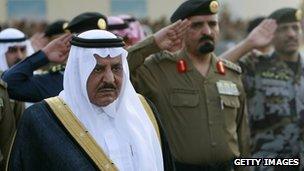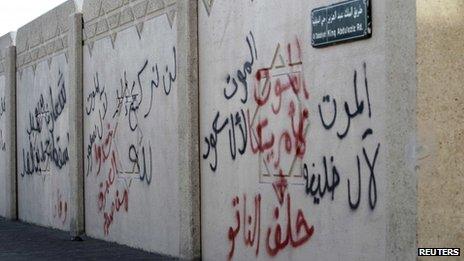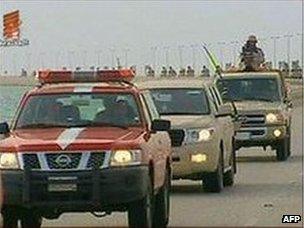Saudi crackdown takes on sectarian character
- Published

Prince Nayef, the Saudi interior minister is said to be deeply suspicious of Iran
In late November in the Saudi Arabian city of Qatif, four young men were shot and killed by security forces over a four-day period.
Qatif, a port in the oil-rich Eastern Province, has a population of roughly half a million, almost all of whom are Shia. The men who were killed were Shia.
Eastern Province has a Shia majority which has long complained of discrimination at the hands of the Sunni ruling family, the Al Saud.
Emboldened by the Arab Spring and a popular uprising in neighbouring Bahrain, also with a Shia majority controlled by a Sunni royal family, protests flared up in March.
Marchers were calling for an end to discrimination and for constitutional reform. In a country where all street protests are illegal, the Saudi authorities were not slow to respond, arresting hundreds and breaking up demonstrations very quickly.
However, after the Bahrain uprising was crushed with the assistance of Saudi and other Gulf troops, the authorities started to come down even harder on dissent in Eastern Province.
Changing times
"Things changed. It was like an instruction had gone out," a Shia businessman told me. He declined to be named for fear of reprisals.
The police stepped up checkpoints, particularly around Qatif, and arrested those who spoke out, including several prominent writers and human rights activists.
But the use of live ammunition and the death of the four young men marked a new and disturbing phase in what had been a longstanding but low-intensity dispute.
Saudi security sources say that the men were armed and operating under the influence of a foreign country - code for Iran.
"The goal of those who provoke unrest is to achieve dubious aims dictated to them by their foreign masters," a spokesman from the interior ministry said.
The protesters' deaths, the first to occur in decades, coincided with the accession of the Interior Minister, Prince Nayef, to crown prince and heir apparent to the Saudi throne.
Prince Nayef is known as a hardline conservative who is deeply distrustful of Shia.
He views dissent in the Eastern Province as evidence of Iranian meddling as Saudi anxiety grows over Iran's nuclear weapons ambitions.
The Wall Street Journal's Ellen Knickmeyer notes that the strategy of blaming it on Iran is one "that the government will stick to".
"It is the button they have chosen to hit," she told me from Riyadh.
"It's a knee-jerk reaction," says Saudi Arabia expert Michael Stephens. Just back from a visit to the kingdom, he says even liberal, secular Saudis see their Shia countrymen as fifth columnists.
"They are utterly convinced that the Shia are loyal only to Iran. That fear is deeply engrained and it is not just the hardliners who have it."
Lesley Hazleton, author of the seminal study, After the Prophet: The Epic Story of the Shia-Sunni Split in Islam, intriguingly compares the response to anti-Semitism.
"The parallels are fascinating - fears of a fifth column, that sense of a conspiracy against the state. Like anti-Semitism, it is always there, and so easy to use and manipulate for political ends," she says.
Bahrain's brief spring
Part of the Saudi authorities' anxiety stems from what has happened in neighbouring Bahrain. The island kingdom is joined by a causeway to Eastern Province.
For years, the Shia of Bahrain have complained of discrimination, poor housing and unemployment. Not without cause, they see themselves as impoverished and suppressed in an island awash with wealth. Low level protests and rioting in Shia villages have been going on for years.
The waves of the Arab Spring hit Bahrain in early February. For a few hectic and delirious days, Pearl Roundabout in the capital, Manama, was in the hands of thousands of peaceful demonstrators - there were some Sunni, however the vast majority were Shia.
Using security forces, the government retook the roundabout but three people died, triggering further protests.
When King Hamad appeared to be wavering and offering concessions to the demonstrators, 1,000 Saudi troops rolled down the causeway, part of a larger Gulf force brought in, it was said, at the request of the Bahraini government.

People in Qatif have called for the downfall of Saudi Arabia and Bahrain's rulers
But a source close to Prince Nayef told me two weeks before the troops arrived that the Bahrainis were on notice that if they did not deal with the demonstrations, the Saudis would do it for them.
The Saudis took up positions at key installations but never intervened directly in policing the demonstrators.
The uprising in Bahrain was put down harshly. At least 35 people died, including five members of the security forces. Hundreds were imprisoned - politicians, human rights activists, journalists, even doctors and nurses from Manama's main hospital. More than 1,000 people were summarily dismissed from their jobs.
As sporadic demonstrations continued, the country effectively split along sectarian lines.
Sunni Bahrainis felt threatened by the protesters and the disruptions to daily life they were causing. Most rallied round the government.
The Shia who took the full brunt of often brutal security measures felt even more alienated.
And their counterparts in Eastern Province were angered that Saudi Arabia, simply by sending in their troops, had played a key role in breaking the back of the uprising.
Iranian bomb worry
But what is already a dangerously charged and emotional situation is stoked even higher by the threat of Iran developing a nuclear weapons capability.

Saudi and other Gulf forces entered Bahrain in March
Prince Turki Al Faisal, the former head of Saudi intelligence and a former ambassador to the United States, has warned Western allies that Saudi Arabia cannot stand still.
In June, the Guardian newspaper reported that he had told a Nato meeting that an Iranian nuclear bomb "would compel Saudi Arabia... to pursue policies which could lead to untold and possibly dramatic consequences".
Michael Stephens of the defence think tank, RUSI, describes the Saudis as being "badly rattled". Senior members of the royal family are, he says, "very worried about the threat."
"It is something they talk about all the time," he adds.
That worry is coupled with a sense of annoyance that Saudi Arabia's historic ally, the United States, is not doing enough to deter the Iranians.
Add in historic attitudes and the ingredients for an ever-widening crackdown on Shia protests are all in place.
Sectarian divisions
One activist who asked not to be named said that the Saudi media is "playing the sectarian card hard", with claims that Shia are disloyal to the government and the nation.
"It gives them more room to discriminate while denying that the problem even exists," the activist added.
But what about the widely held belief that Iran is pulling the strings?
"It is simply not true," the activist said. "There is no evidence, no proof, no conspiracy."
Indeed, a widely praised and recently released independent analysis of the Bahrain uprising categorically, dismissed allegations that Iran was behind the protests there.
But for the Sunni rulers of both countries, and indeed for many of their citizens, hard proof seems not to be required.
Or, as Lesley Hazleton puts it, "reason doesn't hold out long against prejudice".
- Published1 December 2011
- Published1 December 2011
- Published4 October 2011
- Published4 October 2011
- Published15 October 2011
- Published8 December 2011